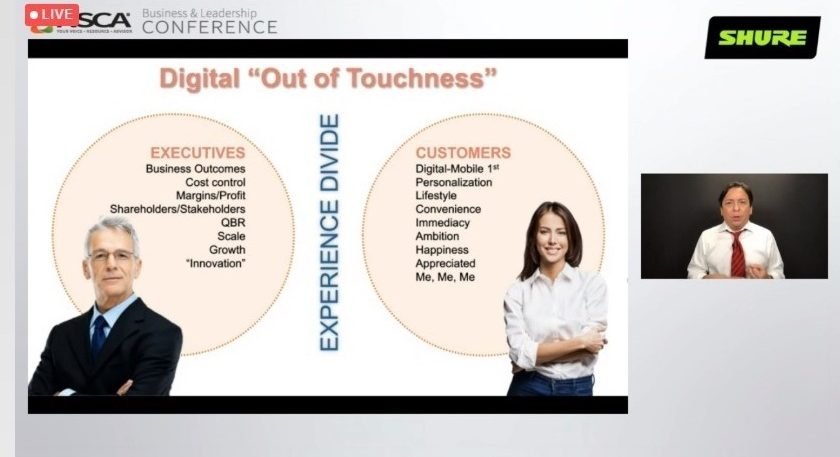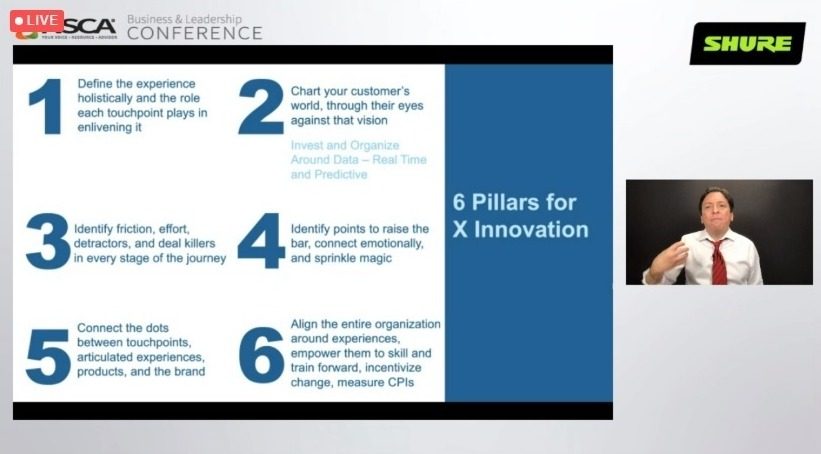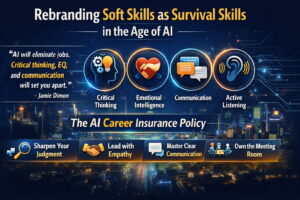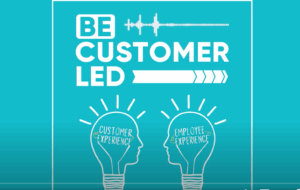
NSCA hosted Brian Solis in its 2021 Business & Leadership Conference Virtual (BLCv) as keynote speaker. NSCA’s Business & Leadership Conference is the industry’s most notable platform for executive-level education and discussion.
Brian’s topic focused on a “Discussion Of Digital-First Customers Informs NSCA Business & Leadership Conference Attendees.” Following his presentation, Sounds & Communications, a publication reaching the commercial AV technology and application industry, shared a thorough summary of his keynote.
Discussion Of Digital-First Customers Informs NSCA Business & Leadership Conference Attendees
by Dan Ferrisi
Yesterday afternoon, NSCA closed out the first day of its 2021 Business & Leadership Conference Virtual (BLCv) with yet another fascinating session, this one titled “Designing for Digital-First Customers: Focus on Experience as a Driver for Breakthrough Innovation.” Presented by Brian Solis, a futurist and Global Innovation Evangelist at Salesforce, the one-hour session explored the incredible changes our society has undergone and how those profound evolutions in customer expectations should affect business owners in their decision-making.
Solis opened the discussion by introducing Digital Darwinism, which describes how technology and society evolve and how organizations can struggle to adapt quickly enough. It’s a particularly timely topic, given that, in Solis’ estimation, the last year has seen transformation accelerate more quickly than at any time in memory. A big part of that, of course, is the novel coronavirus (COVID-19) pandemic, a truly disruptive event on both a personal and professional level. Solis called the onset of the pandemic an “uh-oh moment,” with companies and employees being forced to adapt by, for example, working from home. Digital-first companies and brands—Amazon and Zoom, for instance—were well prepared to capitalize.

Has your organization become digitally out of touch? How do your values align with those of digital-first customers?
Before COVID-19 (or “BC,” as Solis calls it), our society was already on its way to becoming digital first. That’s because Generation C (that is, “Generation Connected) was in ascendance. This generation wants things faster, they want more engagement and interaction, and they want maximum convenience. For Generation C, the most powerful brands are those that are part of our lifestyle—brands like Apple, Google and Amazon. Not coincidentally, those brands and companies align with the on-demand economy, one in which impatience is a virtue. According to Solis, “[Social media] has fundamentally changed how people make decisions.” And if companies are to succeed, they need to contend with people’s rewired brains.
The pandemic has accelerated all those trends, driving us forward into General N (that is, “General Novel”). This generation doesn’t care to go to the grocery store anymore; instead, they get doorstep delivery. And why bother going to restaurants, even when they are open? That’s what DoorDash is for. “Deep within, we changed,” Solis observed. Indeed, by his estimation, ecommerce achieved the equivalent of 10 years worth of growth in the space of a single year. And he cited a study indicating that 73 percent of Americans tried a new business type or shopping behavior during the pandemic, illustrating how widespread the transformation is.

During the COVID-19 pandemic, customers came to embrace “the next big thing,” which was everything from doorstep grocery delivery to DoorDash as an alternative to restaurant dining.
This is why, according to Solis, businesses must commit themselves to innovation. He sought to distinguish iteration—finding ways to do the same thing better—with innovation, which is doing new things. And which new things should we be doing? That’s determined by seeing the world through customers’ eyes—recognizing that their expectations have changed. Decision-makers should ask themselves, “What is it like to do business with our company?”, and they should judge the answer against what people today are demanding. Lots of customers say, “Doing business with Amazon is so easy. I wish every business interaction were like working with Amazon.” What would that mean for a business like yours?
Solis urged everyone to create space for innovation, rather than just becoming caught up in the day to day. For example, would your company benefit from having a Chief Innovation Officer (CIO) whose only focus is helping the firm innovate? “If I’m waiting on someone to tell me what to do, then innovation is going to happen without me,” Solis warned. And the first step is to recognize that customers and clients will measure your company by the experience you deliver. The experience, Solis explained, is the sum of all engagements that a customer has with your organization. One survey indicated that 84 percent of customers value the experience as much as they prize the product or service they’re purchasing. The question is, what kind of experience do your customers not yet know that they want, but, once they have it, they’ll realize they can’t live without it? When you find that and innovate a way to deliver that experience, you’ll be the Amazon of your market.

Brian Solis’ six pillars for experience innovation.
Solis closed with a summation of his six pillars for experience innovation:
- Define the experience holistically, mindful of the role each touchpoint plays.
- Chart your customers’ world, through their eyes, against that vision.
- Identify friction points, detractors and deal-killers.
- Identify points to raise the bar and connect emotionally.
- Connect the dots between touchpoints, articulated experiences, products and the brand.
- Align the entire organization around experiences.
Just as Darwinian evolution cannot be resisted, Digital Darwinism is a fact. Organizations must adapt to digital-first customers—all of us in Generation N. If your organization does, then, perhaps, the next time there is a disruption, you will be causing it, rather than reacting to it.
Please read the original article here.

Brian Solis | Author, Keynote Speaker, Futurist
Brian Solis is world-renowned digital analyst, anthropologist and futurist. He is also a sought-after keynote speaker and an 8x best-selling author. In his new book, Lifescale: How to live a more creative, productive and happy life, Brian tackles the struggles of living in a world rife with constant digital distractions. His previous books, X: The Experience When Business Meets Design and What’s the Future of Business explore the future of customer and user experience design and modernizing customer engagement in the four moments of truth.
Invite him to speak at your next event or bring him in to your organization to inspire colleagues, executives and boards of directors.





Leave a Reply